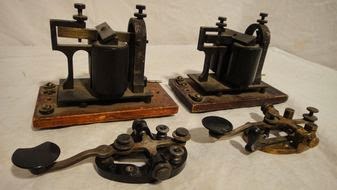[Telegraph keys and sounders at the Willowbrook Museum Village, Newfield, Maine. Photo courtesy Robert Schmick, museum director.]
One of the numerous interesting manuscript orchestral scores I found in
the Boston Theatre Orchestra Collection in Harvard's Houghton Library
this fall is the "Telegraph Polka," [heard here
in my virtual sound demo video], ca. 1870, by Charles Koppitz, who at
the time was music director at the Globe Theatre in Boston.
Calling for an actual telegraph machine as a percussion instrument, Telegraph Polka reminds me of The Typewriter,
composed eighty years later in 1950 for the Boston Pops by Leroy
Anderson. In fact, you could call Charles Koppitz the original Leroy
Anderson of Boston. Anderson, born in Cambridge, and educated at
Harvard, owed his career to the light orchestral music tradition
pioneered by theatre orchestra directors in Victorian Boston like
Koppitz, Napier Lothian and John Braham (arranger of much of the music
in Goodwin and Rice's Evangeline burlesque.)
Willowbrook
Museum director Robert Schmick and I are discussing the possibility of
presenting a pre-concert lecture in connection to the March 21 Gilded Age concert: Telegraph: The Victorian Internet.
It is possibly one of Willowbrook's vintage 1880 telegraph machines
that the percussionist of the Orchestra of the Longfellow Chorus,
Richard Kelly, will be playing.
Another interesting feature of Koppitz's Telegraph Polka
is a quirky, virtuosic bassoon solo in the Trio section -- something
for our excellent principal bassoonist Wren Saunders. Charles Koppitz
probably wrote this solo for Paul Eltz, who a few years after playing in
Koppitz's orchestra at Globe Theatre would become the founding
principal bassoonist of the Boston Symphony. Other original BSO
musicians who had performed as soloists in Koppitz's theater orchestra
were Spanish-American oboist Anthony De Ribas (1814-1907) and violist
Charles Weintz.
Charles Koppitz, in fact, was a virtuoso flute
player as well as a composer and arranger. He frequently featured
himself along with his brother, Henry Koppitz, as piccolo soloists with
his Globe orchestra.
One example is Koppitz's programmatic overture, In the Forest,
for two piccolos, pistol shot and orchestra, a precursor of the genre
that would later become film and then cartoon music. In this comic
piece, a hunter (the percussionist) attempts to subdue two birds (the
piccolos) with his weapon.
When our principal flutist, Melissa Mielens, first saw her piccolo solo part for In the Forest, her response was, "Wow, MASSIVE." You'll hear why in my virtual sound demo video of In the Forest here.
Another Koppitz piece, On the Alps, Ländler for 2 Horns and Orchestra, will feature our excellent horn players, John Boden and Nina Miller, as soloists, complete with alphorn imitation.
Introducing Our Gilded Age Singing Actresses
["Miss Lizzie Webster," ca. 1877, one of many actresses
taking on the role of "Gabriel" in productions of Goodwin and Rice's
"Evangeline." Box 68, Item 530, Theatrical Scrapbook Collection,
1791-1967 (Scrapbook Collection). Harvard Theatre Collection, Houghton
Library, Harvard University.]
Kaitlyn Costello, our soloist as "Gabriel" in "Music From the Gilded Age: the Boston Theatre Orchestra Collection",
March 21, 2015, has gained over seventeen years of dance training and
theater experience. I was impressed by Kaitlyn's singing and acting as
the pageboy Cherubino in Wichita Grand Opera's Marriage of Figaro. ". . . Kaitlyn Costello as the sultry Anita (West Side Story).
Her mezzo-soprano vocals are superb (in songs like "A Boy Like That"),
but her dancing (especially in "America") is off the charts terrific . .
."
-- www.BroadwayWorld.com2014.
Cree Carrico, our soloist as "Evangeline" in "Music From the Gilded Age: The Boston Theatre Orchestra Collection,"
March 21, 2015, combines her talents as actress and singer in opera,
theater and cabaret productions. Cree's comedic interpretation of
Charles Koppitz's I Wonder If He Loves Me? in her audition video
unexpectedly made me burst out laughing. And Cree can be serious, too.
"Flinty yet vulnerable, Carrico sang with wounded smoothness." -- The New York Times.
Charles Kaufmann adds:
Jerome Wright, cellist, and Herb Smith, trumpeter, will be among their colleagues in Maine for this concert.
Jerome Wright, Cellist
Herb Smith, Trumpeter
http://www.herbtrumpet.com
(Photo: Rochester Philharmonic Orchestra, http://www.rpo.org)
(Photo: Rochester Philharmonic Orchestra, http://www.rpo.org)
Stay up to date here. See you in March!
Charles Kaufmann, Artistic Director
Charles Kaufmann, Artistic Director
The Longfellow Chorus
PO Box 5133
Portland, Maine 04101
PO Box 5133
Portland, Maine 04101










No comments:
Post a Comment